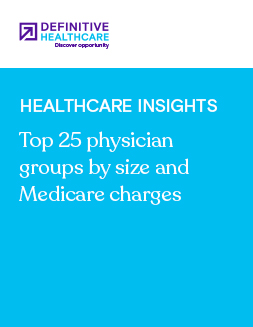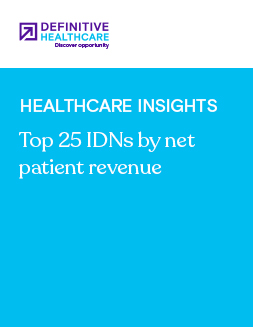Healthcare Insights
Top 10 hospitals using Oracle Cerner's EHR
The electronic health record (EHR) market is highly competitive. These digital tools help doctors and other healthcare providers track and understand a patient’s medical background quickly, easily and without relying on handwritten notes.
According to Definitive Healthcare data, Oracle Cerner is the second most popular EHR vendor in the U.S. with a market share of 22%. Oracle Cerner’s solutions aim to help healthcare providers prioritize the delivery of care by reducing the burden of time-consuming administrative tasks. This technology is further enhanced by Oracle’s considerable cloud computing infrastructure, which could make patient health records easier to access and read while improving security.
Wondering which hospitals use Cerner? Using Definitive Healthcare’s HospitalView product, we ranked the top hospitals in the U.S. using an Oracle Cerner EHR platform by both net patient revenue and number of beds. Data is from the Medicare Cost Report and is according to the most recent 12-month interval tracked in our product.
| Rank | Hospital name | State | NPR | Explore dataset |
|---|---|---|---|---|
| 1 | IU Health Methodist Hospital | IN | $3,924,982,016 | Explore |
| 2 | Northside Hospital Atlanta | GA | $2,794,552,320 | Explore |
| 3 | UAB Hospital | AL | $2,534,353,408 | Explore |
| 4 | Christiana Hospital | DE | $2,401,651,712 | Explore |
| 5 | Penn State Health Milton S Hershey Medical Center | PA | $2,241,911,552 | Explore |
| 6 | Moffitt Cancer Center Magnolia Campus (AKA H Lee Moffitt Cancer Center & Research Institute) | FL | $2,126,449,536 | Explore |
| 7 | Stony Brook University Hospital | NY | $2,066,718,592 | Explore |
| 8 | Los Angeles General Medical Center (FKA LAC & USC Medical Center) | CA | $2,051,636,992 | Explore |
| 9 | Baptist Hospital | FL | $1,905,765,248 | Explore |
| 10 | Westchester Medical Center | NY | $1,774,992,768 | Explore |
Fig. 1 Data is from the Definitive Healthcare HospitalView product. Data is from the Medicare Cost Report and is displayed according to the most recent 12-month interval tracked in our database. Data accessed February 2025.
IU Health Methodist Hospital ranks at the top of our list with net patient revenue of more than $3.9 billion. In second place is Northside Hospital Atlanta, which has an NPR of more than $2.7 billion. Both facilities can also be found on our list of the top 50 hospitals in the U.S. by NPR.
| Rank | Hospital name | State | # of staffed beds | Explore dataset |
|---|---|---|---|---|
| 1 | Jackson Memorial Hospital | FL | 1,608 | Explore |
| 2 | Baptist Medical Center | TX | 1,585 | Explore |
| 3 | IU Health Methodist Hospital | IN | 1,274 | Explore |
| 4 | UAB Hospital | AL | 1,149 | Explore |
| 5 | Christiana Hospital | DE | 906 | Explore |
| 6 | Huntsville Hospital | AL | 904 | Explore |
| 7 | CAMC General Hospital | WV | 803 | Explore |
| 8 | Lakeland Regional Health Medical Center | FL | 764 | Explore |
| 9 | Baystate Medical Center | MA | 740 | Explore |
| 10 | Stony Brook University Hospital | NY | 725 | Explore |
Fig. 2 Data is from the Definitive Healthcare HospitalView product. Data accessed February 2025.
Florida-based Jackson Memorial Hospital ranked first on our list, with a bed count of more than 1,600, followed by Baptist Medical Center in Texas with 1,585 beds and IU Health Methodist Hospital in Indiana with 1,274 beds.
How many hospitals use Cerner EHR?
As of February 2025, more than 2,000 hospitals recorded Cerner Oracle EMR implementations, including hospitals that are part of Atrium Health, Baystate Health, Dignity Health, and more. Memorial Hermann Southwest Hospital in Houston, Texas is the largest hospital, based on number of discharges, with Oracle Cerner installed.
What is an EMR system?
An electronic medical record (EMR) is a digital record of a patient’s health. Information commonly found on an EMR include medical history, diagnoses, medications, lab results, immunizations, allergies, doctors’ notes and more.
An EMR system refers to a suite of integrated, interoperable technologies which work together seamlessly to help healthcare providers deliver care more effectively, maintain compliance, streamline administrative tasks and reduce medical costs. A healthcare provider may install an EMR system comprised of multiple components, such as a patient portal, telemedicine, practice management software, nurse scheduling tools and more.
Learn more
Healthcare Insights are developed with healthcare commercial intelligence from the Definitive Healthcare platform. Want even more insights? Start a free trial now and get access to the latest healthcare commercial intelligence on hospitals, physicians and other healthcare providers.


